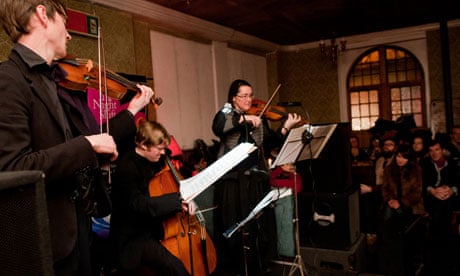The 'rules' of concert-going today - sit still, keep quiet, concentrate, only applaud at the end of a piece - often make us feel uncomfortable, and produce a less than authentic experience. And, of course, the other way most of us tend to listen to music - on headphones, sealed into our private own world - would be similarly incomprehensible to composers, musicians and audiences of previous centuries.
Music should be a very social experience. Today, it sometimes feels as if we've lost sight of this. Chamber music in the 17th, 18th and 19th centuries was written to be performed in domestic settings - usually in upper-class homes to a circle of friends and acquaintances. We no longer have these kind of domestic venues and the social and intimate listening experience that came with them. There are of course groups who do still make music together in their homes, and a small circle of the very wealthy who have both space and funds to invite chamber groups into their homes, but for most of us who want to hear chamber music you have to go the formality of the concert hall.
The Orchestra of the Age of Enlightenment - where I'm joint leader - are mid-way through something a little unusual. We're out on the road on tour, but rather than concert halls, our venues are London pubs. Our aim is to put the social back into music. The music that we're playing - Purcell, from the 17th century and Italian chamber music from the 18th - was, after all, written to be played in domestic settings, not to a hushed, seated and reverential audience. We're including some of Purcell's drinking songs, songs that would have been played in a London pubs just like this, where his audience wouldn't have been sitting quietly - on the contrary!
I'd like to think that some people will feel that we have broken down some conventions and after this they might like to try other performances of classical music, but this isn't about enticing people into the concert-hall to hear an 80-piece OAE in concert, this is about empowerment. Audiences want to have a bit more ownership of what they're listening to. The best performances involve a three-way relationship - the music (ie what's on the page) the audience and the performers. The performers react not only to the written notes but to each other and most importantly, to the audience. But all too often in today's concerts, the third part of that equation is forgotten. Often when we're performing you can't even see beyond the first couple of rows, let alone to the back of a thousand-seat hall.
Playing in pubs to a group of people so close you can touch them has been an amazing experience. I'm loving it, and I can see and feel that audiences are too. We've played two nights of our pub-crawl so far, tomorrow night we're at The Paradise, Kensal Green and there are two more to come (Soho and Islington) on this tour. As we wound down after the last set in New Cross last week our cellist, Robin Michael said to me, "How about Haydn next? They'd love it!" And it's true - the fantastically social nature of Haydn's quartets would be wonderful to enjoy, explain and encounter with a pub audience.
You might think that the informality of these venues would create a casual relationship with the music - I'm often asked if pub venues means it's noisy, but not a bit of it (the clank of a few glasses from the bar aside). In fact we've found that there seems to be an enhanced degree of listening as people are much more directly involved in the music making, and this intense listening creates the atmosphere of the performance. I like to think that we are sharing in each other's listening.
We are, of course, playing acoustic instruments, un-amplified, and so far the events are ticketed, so most of our audience have come to listen to the music. But for audience and musicians alike, this has been a special experience. Maybe there's an optimum number of people who can "musick" together like this. Certainly, with 2,000 people its more difficult to create the intensity and communication that we've had at our pub gigs.
My most memorable moments from the first few gigs? The intensity of Purcell's G minor sonata experienced in packed pub in Shadwell, Matt [Truscott, fellow violinist] in a silk headscarf as "Camilla" pretending to kill himself with his violin bow, and then teaching the assembled company suitable rhetorical theatrical gestures for a four-part drinking song. And, of course, one of the best bits has been being able to stop playing and be 15 seconds rather 15 minutes away from the nearest bar and a well-earned pint!
* More details about the OAE's Night Shift series at
oae.co.uk/thenightshift, or on facebook

Comments (…)
Sign in or create your Guardian account to join the discussion